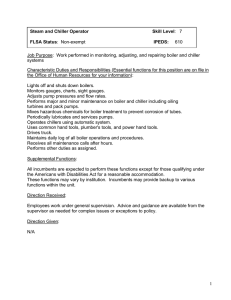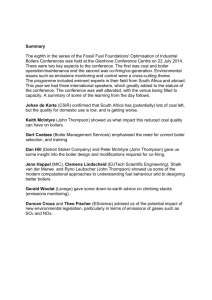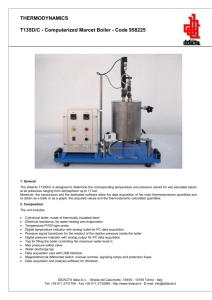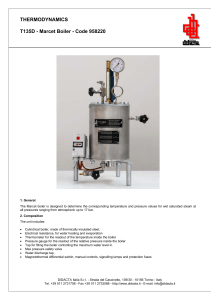VHA PROGRAM GUIDE PG-18-3 April 2001 TOPIC 9. ENERGY CENTER
advertisement
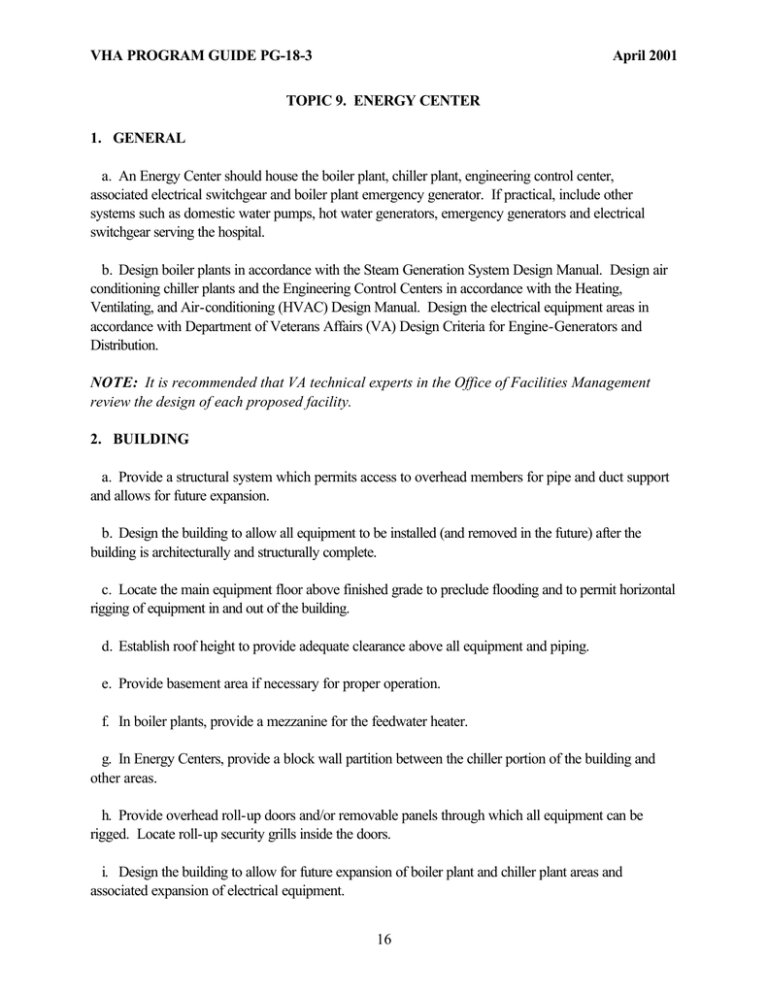
VHA PROGRAM GUIDE PG-18-3 April 2001 TOPIC 9. ENERGY CENTER 1. GENERAL a. An Energy Center should house the boiler plant, chiller plant, engineering control center, associated electrical switchgear and boiler plant emergency generator. If practical, include other systems such as domestic water pumps, hot water generators, emergency generators and electrical switchgear serving the hospital. b. Design boiler plants in accordance with the Steam Generation System Design Manual. Design air conditioning chiller plants and the Engineering Control Centers in accordance with the Heating, Ventilating, and Air-conditioning (HVAC) Design Manual. Design the electrical equipment areas in accordance with Department of Veterans Affairs (VA) Design Criteria for Engine-Generators and Distribution. NOTE: It is recommended that VA technical experts in the Office of Facilities Management review the design of each proposed facility. 2. BUILDING a. Provide a structural system which permits access to overhead members for pipe and duct support and allows for future expansion. b. Design the building to allow all equipment to be installed (and removed in the future) after the building is architecturally and structurally complete. c. Locate the main equipment floor above finished grade to preclude flooding and to permit horizontal rigging of equipment in and out of the building. d. Establish roof height to provide adequate clearance above all equipment and piping. e. Provide basement area if necessary for proper operation. f. In boiler plants, provide a mezzanine for the feedwater heater. g. In Energy Centers, provide a block wall partition between the chiller portion of the building and other areas. h. Provide overhead roll-up doors and/or removable panels through which all equipment can be rigged. Locate roll-up security grills inside the doors. i. Design the building to allow for future expansion of boiler plant and chiller plant areas and associated expansion of electrical equipment. 16 VHA PROGRAM GUIDE PG-18-3 April 2001 3. SITE a. Provide space for future expansion of the boiler plant and chiller plant. b. Provide an area for underground or aboveground fuel oil tanks for boilers and engine-generators. 4. PLANT FACILITIES a. Plant Arrangement (1) Arrange boilers, chillers, emergency generators, control and instrumentation panels, motor control center along an aisle. (2) Locate all equipment to allow operation, maintenance, repair and replacement without disturbing other equipment or piping systems. (3) Provide unobstructed view from aisle of all boiler-mounted and burner-mounted gages and indicators. (4) Design the control and instrumentation panels to be visible from the aisle, and to the maximum extent possible, visible from the operations room. (5) Locate all valves not more than 2100 mm (7 ft.) above a floor, mezzanine, or platform. Limited exceptions are permitted for valves that are rarely used and can be reached with portable ladders. (6) Locate electrical generators so they are visible from the room that contains their paralleling and distribution equipment, via view window. b. Access Platforms (1) Provide platforms as necessary to allow access to equipment requiring maintenance which is located more than 4.5 m (15 ft.) above the floor or which is not accessible directly from a portable ladder; (2) Provide permanent ladders for access to all platforms. The design of ladders and platforms should conform to Occupational Safety and Health Administration (OSHA) requirements; and (3) Provide platforms as required by the Steam Generation Design Manual for boiler plant. 17 VHA PROGRAM GUIDE PG-18-3 April 2001 c. Building Heating, Ventilating, Air-Conditioning and Noise Control (1) Provide combustion and ventilation air intakes through the building walls and roof; (2) Provide roof-mounted exhaust fans; (3) Provide heat in personnel rooms to maintain 21°C (70°F); (4) Provide heat as necessary in the equipment spaces to maintain 18°C (65°F); (5) Provide air-conditioning in the personnel spaces including operations room, eating area, office, toilet, shower and locker rooms; (6) Provide noise control in the operations room and the office in accordance with Noise Transmission Control (Chapter 8); and d. Boiler Stack and Diesel Engine Exhaust. Locate boiler stack and diesel engine exhaust outlets to avoid entraining the gases into building air intakes. 18
